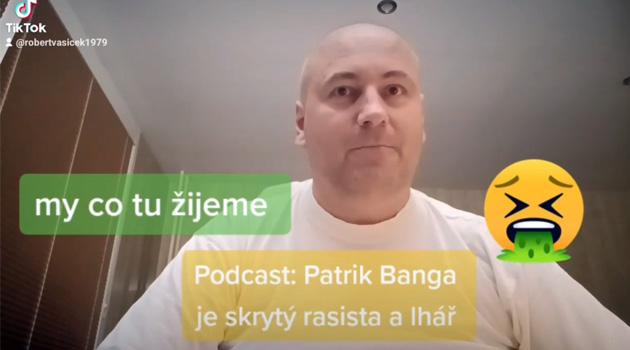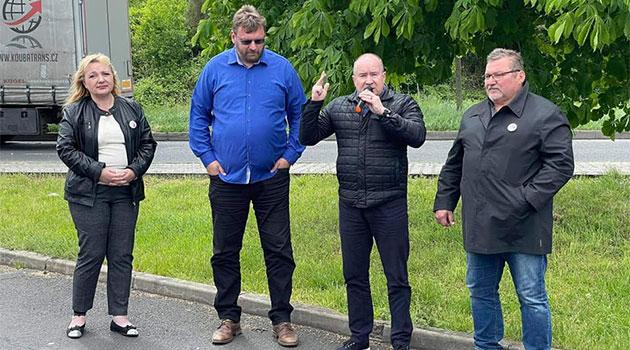Chair of Roma Luma party compiles list of Romani people whom he calls "collaborators and traitors", his fellow non-Roma candidate defends ultranationalists

A podcast by journalist Patrik Banga in his BEZ OBALU (“STRAIGHT TALK”) series focusing on Romani politicians who associate and cooperate with extremists has sparked a tempestuous reaction on Czech social media. Robert Vašíček, formerly a member of the “Freedom and Direct Democracy” (SPD) party, has published a video calling Banga a closet racist and a liar and has claimed the SPD has never espoused racist values.
Marco Cavali, the chair of the Roma Luma political party, is running together with Vašíček on the same candidate list in the countrywide elections for municipal assembly next month. In response to Banga’s podcast and criticsm, Cavali has published a video with a list of people whom he calls “Romani traitors”.
Robert Vašíček: Patrik Banga is a closet racist and a liar
Vašíček has sent a very long letter to the editors of news server Romea.cz entitled “Patrik Banga is a closet racist and a liar”. The text includes many links to online material, and he published it along with a video version of it to his own social media profiles, linking to material where he objects to Banga’s podcast and rejects the allegation that he is an extremist.
According to Banga, Vašíček is the key figure who connects the extremist scene to the Romani community. “Whoever cooperates with the promoters of disinformation is an extremist as far as I am concerned. If somebody is collaborating with Patrik Tušl, who was prosecuted for threatening to murder his own wife and who is currently in custody for attacking people, then that is all the more reason to consider them an extremist. In my view, this is an absolutely textbook example of extremism. Vašíček is the link between the extremists and the Roma,” he told news server Romea.cz.
News server PrahaIN.cz previously called Vašíček an extremist when reporting on the Municipal Department of Prague 11, the open sessions of its assembly members, and the dismissal of Vašíček from its committees. “Local assembly member Robert Vašíček has, since the beginning of the war on Ukraine, disseminated videos online through which he casts doubt on the position of Ukraine as a fully independent, sovereign state, spreads disinformation about Russia’s aggression against Ukraine, and attempts to question the legitimacy of aiding the refugees from Ukraine in a way that borders on xenophobic,” the news server cited the reasons for Vašíček’s dismissal from the materials produced to explain the decision.
Vašíček disagrees with Banga’s claim that the SPD espouses racist values. “The SPD does not espouse racist values. I know something about this because I was the vice-chair of SPD Prague and I put out videos at that time that were seen by many in which I clearly distanced myself from racism and violence in politics,” he wrote to Romea.cz.
As proof of that claim, the politician provided links to two videos from that time. Banga has quoted some of Vašíček’s output in his podcast, such as: “This is my usual skin color, which is a bit lighter. This is my current, Spanish skin color. Look at the contrast between the pigment and my nails. Friends, once I get back to the Czech Republic, I will apply for welfare.”
Vašíček claims that material was just a “little joke” which Banga has edited tendentiously from the “feature film” (his video) called “Travelling with dogs across Europe”. “I condemn racism, hate and war more than once in that film, but Patrik’s job was to turn me into a racist,” the politician said.
“At 11:10 [in the podcast] Patrik manipulatively alleges that I just began taking an interest in Romani people this year,” Vašíček has written. However, there is no such claim made by Banga in the podcast.
At that point in the podcast, Banga says of Vašíček that “this time he began fighting for the Roma”. There is no mention of Vašíček having previously been inactive with regard to Romani people, however.
Vašíček, a former SPD member, says he did not just begin to take an interest in Romani people ahead of next month’s elections to local assemblies. He recalls the year 2002, when he was the lead candidate for the Party for Social Security (Strany za životní jistoty).
“And a young 22-year-old Robert Vašíček advocated for the elite Romani candidate Vladislav Suchánek to be in fifth place on the candidate list,” he writes of himself in the third person, also recalling the year 2014, when he led the “Solutions for Prague” (Řešení pro Prahu) candidate list for elections to the Prague assembly, which featured Romani candidates Štefan Tišer and Emil Zajac. “In 2018 I ran for that same local assembly with the SPD movement and because I cooperate with the Vietnamese community, I advocated for Thanh Hoang, a Vietnamese candidate, to run in 7th place on the list, ahead of me,” Vašíček said.
The politician also explains in his video why he believes Banga is “xenophobic” toward other Romani people. “The actual reason for this xenophobia of Patrik Banga, a Romani man, toward other Roma is that Roma Luma is loudly criticizing the inactivity of Romani nonprofit organizations, among others Patrik’s home organization of ROMEA, which released his podcast,” Vašíček posted.
At the close of his message, Vašíček then calls on Banga to “crawl into a sewer”. The conclusion he arrives at is the following: “It has been unequivocally confirmed that Patrik Banga is a dangerous liar and manipulator and a closet racist who, for money from nonprofits, harms the Roma who want to stand on their own two feet, who want to emancipate themselves civically and politically, and who do not need unnecessary nonprofits for that. Patrik, it’s high time for you to crawl into a sewer, but before you do so, apologize to Roma Luma. I don’t need your apology, I have already forgiven you for your lies and for the evil in your heart.”
Marco Cavali, chair of Roma Luma, publishes list of Romani people whom he calls “collaborators and traitors”
One of the two chairs of the Romani-profiled political party Roma Luma, Marco Cavali, responded to Banga’s podcast and to the criticism he has been receiving from other Romani community members on Facebook. Cavali released a video that includes a list of Romani “collaborators and traitors”.
“Gentlemen, this is to remember me by, so we don’t forget what kind of people you actually all are,” Cavali posted to Facebook. One Romani person targeted by the video as a “collaborator” who has allegedly never aided his fellow Roma in any way is, for example, Jan Houška, who regularly posts his opinions to Facebook and holds discussions with other figures from the Romani community about the current situation of Romani people in the Czech Republic and beyond, about politics, and about racism.
Cavali has also labeled as a “Romani traitor” Josef Stojka, who is a member of the Czech Government Council on Romani Minority Affairs and chair of the Union of Vlax Roma. Stojka criticized Vašíček when he called on Romani people to attend what was called the “Meeting of Patriots at Příčovy”.
Those gatherings are regularly attended by members of the SPD, by the chair of the anti-Roma Workers’ Social Justice Party (Dělnická strana sociální spravedlnosti – DSSS), Tomáš Vandas, members of the Tricolor party and other small “patriotic” groups, some of which have also been mentioned in the Czech Government’s reports on extremism. Vašíček took a photo this year there together with the chair of Tricolor, Zuzana Majerová Zahradníková.
Majerová Zahradníková is famous for fighting what she calls “political correctness” and has published on Facebook, for example, her opinions on how the terms used to refer to Black people in the USA have developed over time. In the comments posted to the discussion beneath that contribution of hers, others naturally discussed the terms used to refer to Romani people, and the chair of Tricolor “liked” a comment alleging that “of course” the Romani people have actually been “gypsies” since time immemorial,
Patrik Banga has also been labeled a “liar and the king of disinformation” by this circle of politicians. Cavali’s effort is not the first time he has appeared on an “enemies” list of this kind.
The antisemitic extremist Adam B. Bartoš, chair of “National Democracy”, included Banga on what he called his “List of the Bleeding Hearts” in 2013. That party, just like the SPD, is regularly mentioned in the Czech Government’s reports on bias violence and extremism.
Attacks on journalists are a standard component of some politicians’ rhetoric
As Adam Černý, chair of the Czech Journalists’ Syndicate, has previously warned, attacking the media and insulting journalists has, in recent years, become a standard component of the rhetoric used by some politicians who, thanks to social media, are able to directly target their voters. “For quite some time now we have been observing attacks on independent media. Accusations against them are expressed without relevant evidence,” Černý said in 2019 after a court ordered the chair of the SPD, Tomio Okamura, to apologize to the operators of the
HlídacíPes.org (“watchdog.org”) news server for calling it “fraudulent”.
Czech President Miloš Zeman’s remark about “getting rid of” journalists, which he claims he made as a “joke” during a meeting with Russian President Vladimir Putin, is also well-known. “Are any other journalists here? There are too many journalists, they should be gotten rid of,” Zeman said on that occasion in Beijing.
The boss of the Kremlin responded: “It’s not necessary to get rid of them, it’s possible to restrict them.” Donald Trump, formerly the President of the United States of America, has frequently attacked the press as well, both in and out of office.
Daniel Anýž, a reporter for news server Aktuálně.cz, said of Trump that: “He popularized the concept of ‘fake news’ and turned it against the media. He dislikes how they report on just about anything he does.”
In the European Union and the countries attempting to join it, journalists faced escalating physical assaults and bigger cyberspace threats in 2020. “We are recording more and more frequent violent attacks on journalists, online threats, and also their increased economic insecurity,” said Pier Luigi Parci of the European University Institute, which published a report on media pluralism in 2021.
